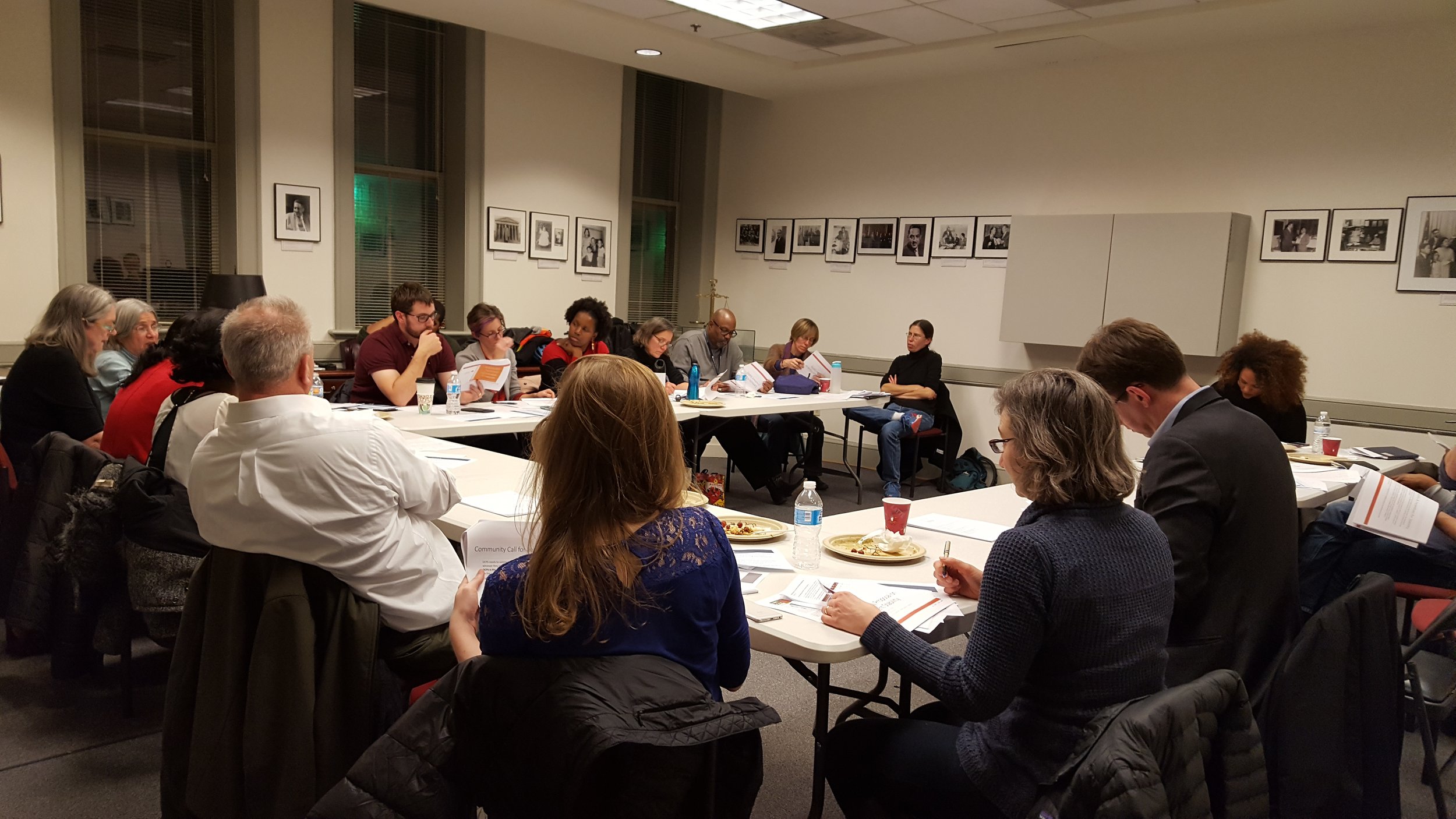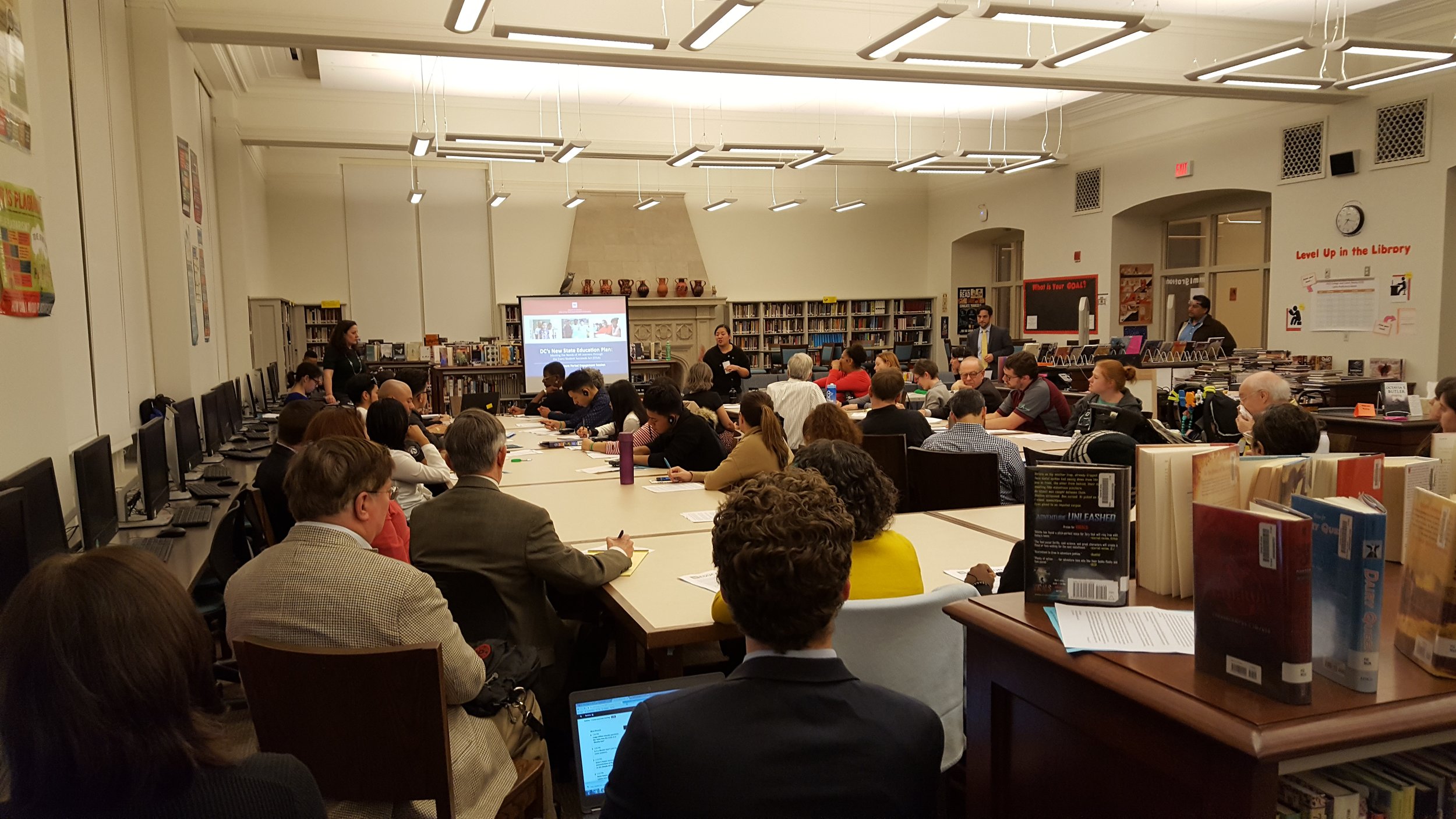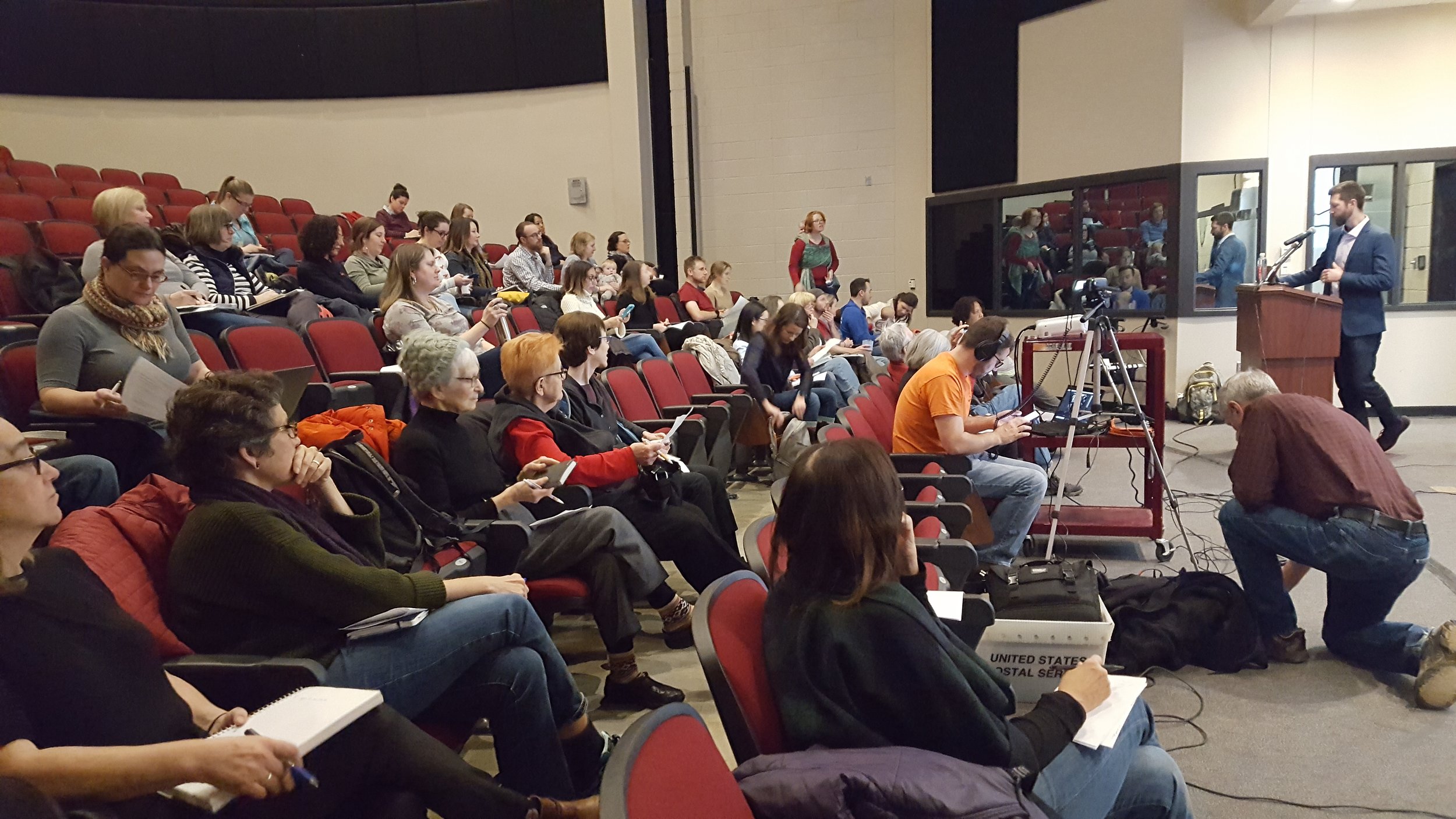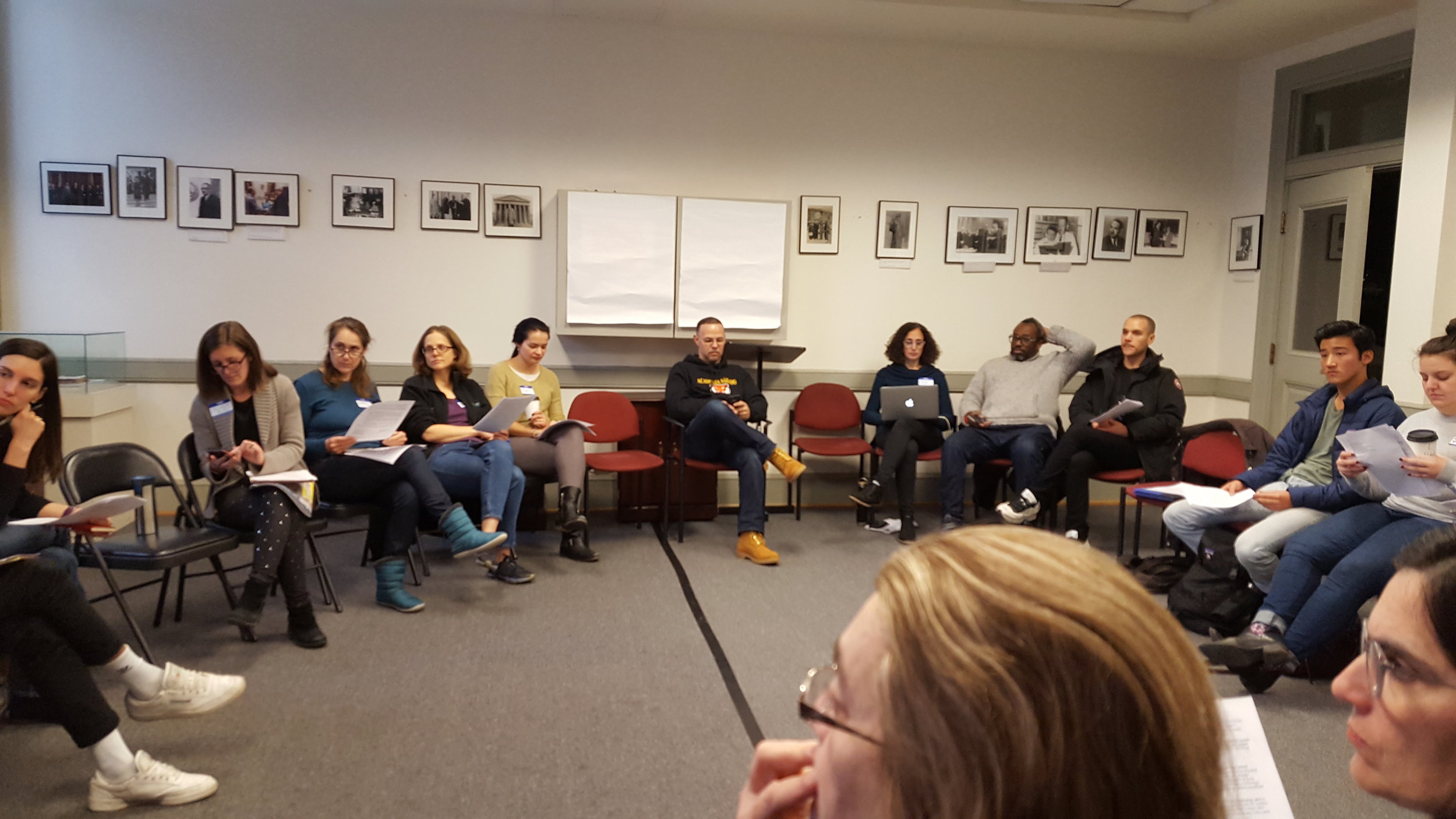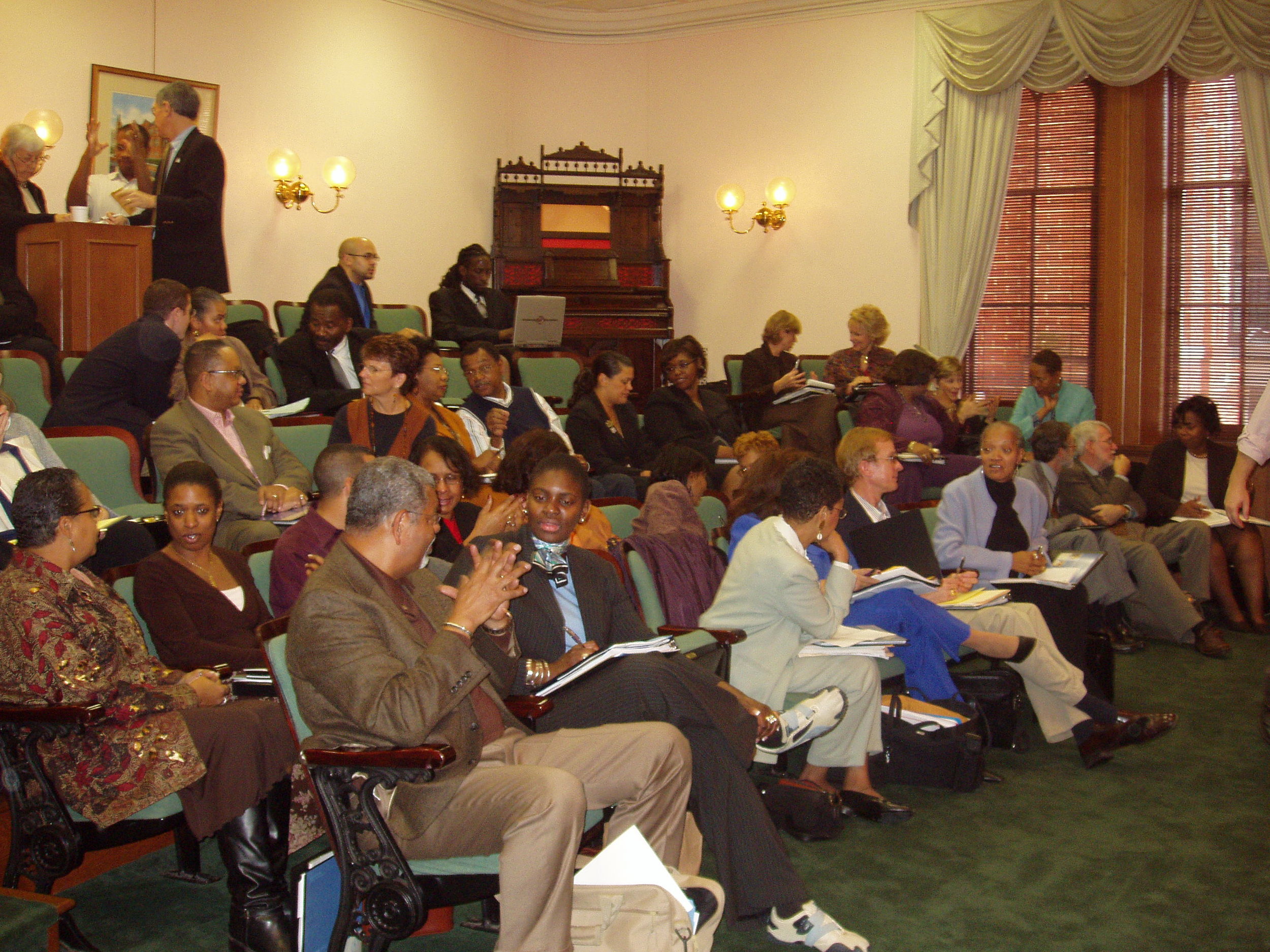Laura Fuchs: Testimony on “Schools First in Budgeting Amendment Act of 2021” ”
/TESTIMONY BEFORE THE COMMITTEE OF THE WHOLE, DISTRICT OF COLUMBIA COUNCIL
Bill 24-570 “Schools First in Budgeting Amendment Act of 2021” and Bill 24-571 “Schools Full Budgeting Amendment Act of 2021”
Laura Fuchs, DCPS Teacher at HD Woodson HS, Secretary of the Washington Teachers Union, Chair of the DC Caucus of Rank and File Educators (DC-CORE), Board Member of Empower DC, Member of the Senior High Alliance of Parents, Principals and Educators (SHAPPE), Ward 5 and Ward 7 Education Councils, and Ward 5 Resident
September 16, 2022
Listening to Council Chairman Phil Mendelson speak on this bill I am glad to see that we are focusing on one of the chief concerns many of us have had for a long time – the size of Central Office. I hope that, as others have brought up, that we do everything we can to protect the neighborhood public schools from being closed.
I do think that Central Office provides important logistical support for our schools. Something it is failing in dramatically. Teachers wait for months to have basic paperwork processed. Pay is done incorrectly. Teachers still haven’t gotten paid for work done last year. In that vein if DCPS needs more money to hire additional workers for these important functions, I think that it is reasonable to increase the “Central Administration” staffing to make sure they can increase staffing in this highly necessary area.
On the other hand, the “School Support” section of the budget is the one that causes by far the most problems and unfunded mandates for our local schools and is at the heart of why we show up and testify at length about our problems with central office. Instead of supporting our schools they create additional paperwork, programs, and more to justify their own existence in a top down manner rather than supporting our schools from the bottom up. They are so large that they often fail to communicate with each other, often doing many redundant and sometimes contradictory requests, usually with zero understanding of policy and practice. This section of the budget could be significantly reduced – by at least half - and our educators would thank you for it.
Average Salaries in schools – this is a tricky issue. I understand why many view it as a problem with equity because oftentimes schools in the most under-resourced wards often have younger staff. But if we don’t use average salaries, it could lead to schools choosing to push out or fire an older and more experienced teacher because they could hire two younger teachers for the same amount of money, or not being able to hire a more experienced teacher for a given position dependent on the budget, thus exacerbating the problem.
I know this isn’t a part of this legislation necessarily, but I would like for the legislation to increase the power of the Local School Advisory Team (LSAT) within this process. Too often principals are subject to intense pressure from Central Office to use certain programs, or waste money on school-based administration instead of front-line workers. If the LSAT had final sign off power – not just that a letter is shared if we disagree – but actually we HAD to sign off on the budget in order for it to be approved, that would force the principal to work with educators and parents to ensure that our budget is what is best serving our students, not serving DCPS paperwork mandates.
We have said it before and clearly we will have to say it again: Budgets are moral documents and are the foundation upon which our education programming is built. It is simply not possible to achieve our ambitious and important equity goals without equitable funding. And as we have seen time and time again, equity cannot be achieved if left up solely to a Mayor and their central office team – it must be inclusive of the stakeholders and those who are actually implementing the policy – and we cannot operate in the dark.
For the past 13 years I have sat and sometimes chaired the Local School Advisory Team at HD Woodson HS. Thanks to the guidance of experts like Mary Levy and DC Fiscal Policy Institute analysists, I have pored over budget documents and attempted to figure out if HD Woodson was getting the money it was owed by law. DC Public Schools has consistently made that almost impossible, taking up hours and hours of time just trying to get the right number that we are owed by law that would be better spent strategizing what to do with the proper amount of money. This has allowed our students to be consistently shortchanged in At-Risk, Special Education, English Language Learner and General Education dollars (as has been proven for At-Risk funds by the DC Auditor) and forces our school to rely on inconsistent sources of staffing that remove most of our local school’s decision-making power.
Year after year educators are cut from our schools as central office and school-based administrations often grow. This attitude towards what matters – upper management over direct services – is endemic to the education reform culture that was brought in by Michelle Rhee and has been continued by every successive Chancellor who has openly shared their attitude that central office is what drives important changes, not educators with students. While DCPS Central office continues to expand their spending, our school has made consistent cuts to services we can provide our services that are far bigger than is warranted by our student population.
I appreciate that we are trying to address this problem. We need to do whatever is possible to upend the current system of budgeting. Schools should be the ones who create their budgets. They should work with budget experts to decide what should be prioritized – small class sizes, reading and math supports, advanced placement, NAF, social work and counselor ratios, SEL Programming, etc. etc. etc. – then the budget should be built to meet the needs of the schools for the long term, focused on growing and strengthening the programming over time. Central office should not be dictating how schools should make due with increasingly limited means, they should be the ones figuring out how to support schools. Central office should be lean and mean to better support schools and put the budget where it belongs: in our classrooms servicing our students.
I hope that we find ways to stop DCPS to categorize their spending by grade levels served will just give DCPS Central Office the door to further obfuscate what they are doing and its impacts. When you have over 600 people in a centralized location they have a lot of time to justify their existence while teachers actually working with students lose their jobs. There will be no additional information of use – especially if past documentation efforts by DCPS are any indication of how seriously they take these reporting requirements.
We need a clear definition of what makes a Central Office employee and then we need to hold DCPS to the law of only spending 5% or less on those activities. We are at least three times above the legal limit right now. We need more information on external contracts. I went through the spreadsheet submitted to the Council and it took hours of time to organize the information into useful pieces and I found many contracts that ostensibly did the same thing but were purchased from different offices from different companies. Either they were actually doing the same thing, or the reporting requirements are so general that we don’t actually know what was being paid for. On top of this there was zero justification as to whether these contracts – many that have gone on for years – have actually achieved the “results” that we are paying for.
I also want to caution against assuming a buzzword like “student based budgeting” will automatically fix our budgeting problems. Many systems, like Chicago, are trying to move to our model because it actually provides more stability and makes school budgets less dependent on enrollment numbers and instead focuses on what the base-line level of what every school should have no matter what. The problem we have in DC Public Schools is that DCPS is not following its own policies. Changing the policy without some mechanism to actually make DCPS follow it will not change the problem. Enforcing the Comprehensive Staffing Model and actually following it would mean every school, even the small ones with fluctuating enrollments, would have everything they need to provide a robust education for their students. What we need to add is a more inclusive process for creating that baseline, mechanisms to clearly ensure that schools are getting what they are owed in that model, and then making sure that additional funds for specialized programming, Special Education, English Language Learners and At Risk students are added on top of that model.
DCPS Needs to follow the DC Auditors recommendations and keep one set of books that is open and completely transparent. What a principal sees at their school level should be the same thing an LSAT chair sees and should be the same thing the Council sees. We waste endless amounts of time with multiple books where nobody knows what is true and what isn’t – even the people who are tasked and paid very well for creating them.
Ultimately though none of this will matter if DCPS is allowed to flout the law with zero consequences. The Council needs to use its budgetary authority to force DCPS to follow the laws that are being written by this body. My suggestion – hold the pay of all Central Office employees until the requirements are verifiably met. We have allowed countless students to be underserved, educators who work directly with students to lose their livelihoods and an expanding “achievement” and resource gap under the watch of mayoral control. Enough is enough. This body took on the role of the school board when they empowered the Mayor and removed all authority from the school board. This is on you as much as it is on the Mayor.

